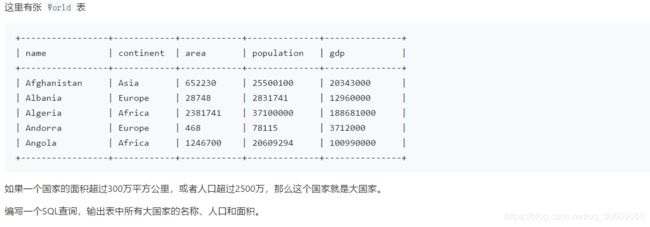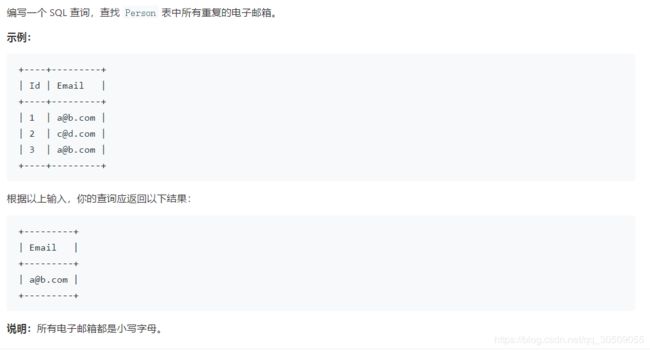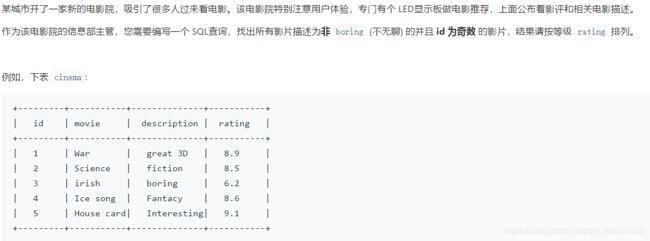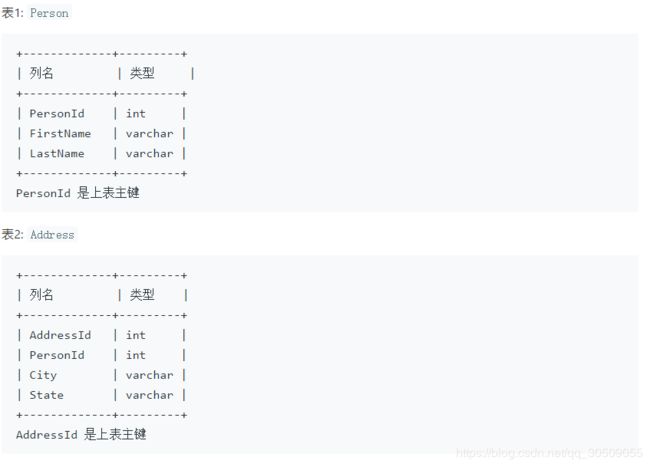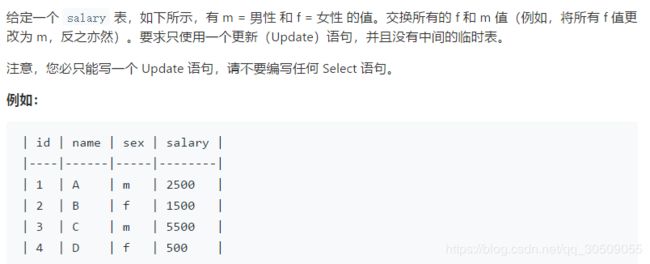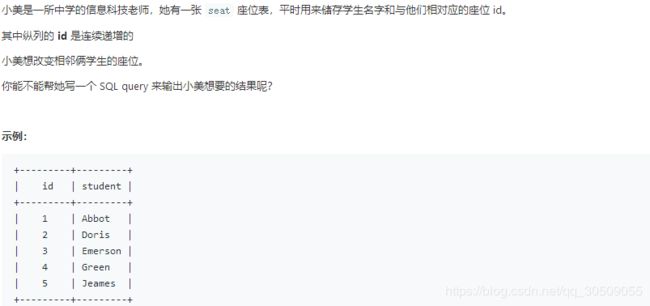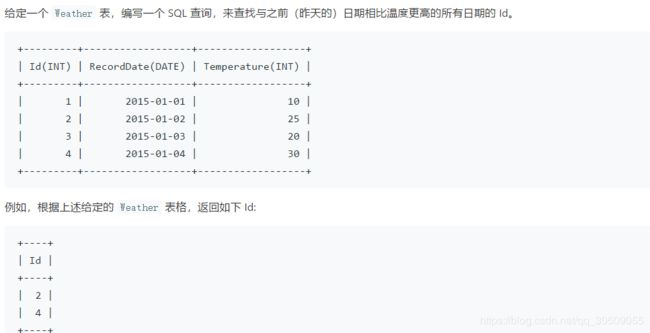MSQL——力扣SQL语句练习
1.【查找重复邮箱】编写一个 SQL 查询,来删除 Person 表中所有重复的电子邮箱,重复的邮箱里只保留 Id 最小 的那个。
+----+------------------+
| Id | Email |
+----+------------------+
| 1 | [email protected] |
| 2 | [email protected] |
| 3 | [email protected] |
+----+------------------+SELECT p1.*
FROM Person p1,
Person p2
WHERE
p1.Email = p2.EmailId 是这个表的主键。
例如,在运行你的查询语句之后,上面的 Person表应返回以下几行:+----+------------------+
| Id | Email |
+----+------------------+
| 1 | [email protected] |
| 2 | [email protected] |
+----+------------------+答案:delete from Person where Id not in(select Id from ( select min(Id) Id,Email from Person group by Email)t)
官方答案方法:使用
DELETE和WHERE子句算法
我们可以使用以下代码,将此表与它自身在电子邮箱列中连接起来
SELECT p1.* FROM Person p1, Person p2 WHERE p1.Email = p2.Email ;然后我们需要找到其他记录中具有相同电子邮件地址的更大 ID。所以我们可以像这样给
WHERE子句添加一个新的条件SELECT p1.* FROM Person p1, Person p2 WHERE p1.Email = p2.Email AND p1.Id > p2.Id ;因为我们已经得到了要删除的记录,所以我们最终可以将该语句更改为
DELETEDELETE p1 FROM Person p1, Person p2 WHERE p1.Email = p2.Email AND p1.Id > p2.Id
答案:select name,population,area from World where area > 3000000 or population > 25000000;
select name ,population ,area from World where area > 3000000 UNION select name ,population ,area from World where population > 25000000;
3.【查找重复电子邮箱】
答案:select email from Person group by email having count(email)>1;
答案:select Email from(select Email, count(Email) as num from Person group by Email) as statistic where num > 1;
4. 【有趣的电影】
答案: select * from cinema where mod(id, 2) = 1 and description != 'boring' order by rating DESC;
取余是用函数mod(numer1,number2),其返回的值为其余数值
如:mod(id,2) = 1 返回id号是奇数的id
5.【组合两个表】
编写一个 SQL 查询,满足条件:无论 person 是否有地址信息,都需要基于上述两表提供 person 的以下信息:
FirstName, LastName, City, State
答案:select FirstName, LastName, City, State from Person left join Address on Person.PersonId = Address.PersonId;
6.【交换工资】
答案: UPDATE salary SET sex = CASE sex WHEN 'm' THEN 'f' ELSE 'm' END;
7.【超过经理收入的员工】
答案:select p2.name Employee from employee p1 inner join employee p2 on p1.Id = p2.ManagerId and p2.Salary > p1.Salary and p2.ManagerId IS NOT NULL
答案:select a.Name as Employee from Employee a where a.Salary > (select b.Salary from Employee b where b.Id = a.ManagerId)
8. 【从不订购的客户】
答案:select Name as Customers from Customers c left join Orders o on c.Id=o.CustomerId where o.CustomerId is null
答案:select Name as Customers from Customers as c1 where c1.Id not in ( select distinct CustomerId
from Orders)
9. 【换座位】
答案:
select (case
when mod(id,2) =1 and id = sm.ma then id
when mod(id,2) =1 and id <> sm.ma then id+1
else id-1
end) id,
student
from seat,(select max(id) as ma from seat) sm order by id 10.【上升的温度】
答案:SELECT weather.id AS 'Id' FROM weather JOIN weather w ON DATEDIFF(weather.RecordDate, w.RecordDate) = 1 AND weather.Temperature > w.Temperature;
DATEDIFF() 函数返回两个日期之间的天数。语法DATEDIFF(date1,date2)
11.【超过5名学生的课】
答案:select class from courses group by class having count(distinct(student))>4
12.【第二高的薪水】
答案:SELECT(SELECT DISTINCT Salary FROM Employee ORDER BY Salary DESC LIMIT 1 OFFSET 1) AS SecondHighestSalary
答案:SELECT IFNULL( (SELECT DISTINCT Salary FROM Employee ORDER BY Salary DESC LIMIT 1 OFFSET 1), NULL) AS SecondHighestSalary
//待续*********
